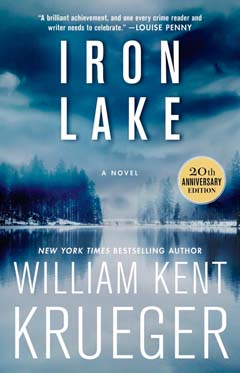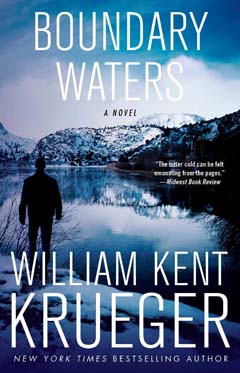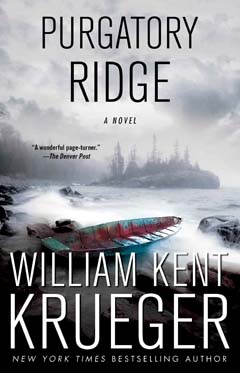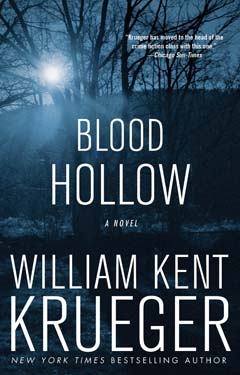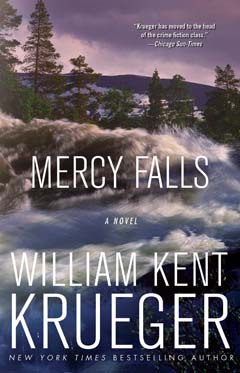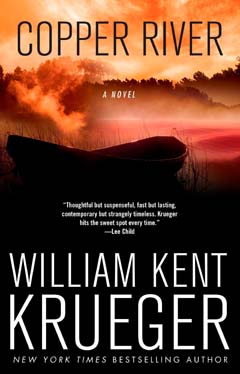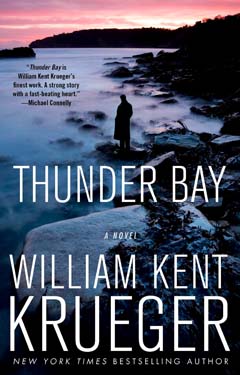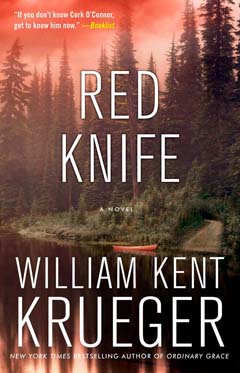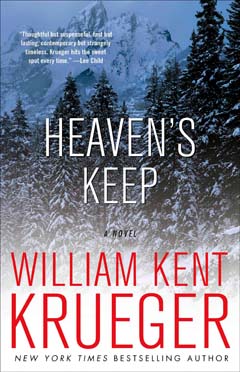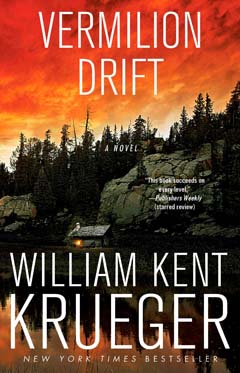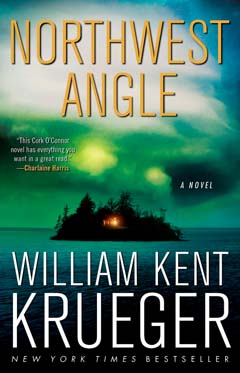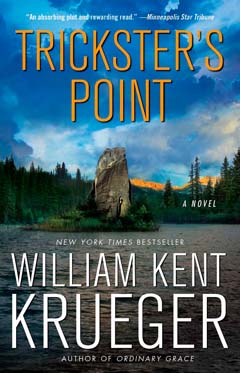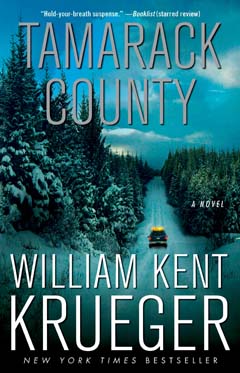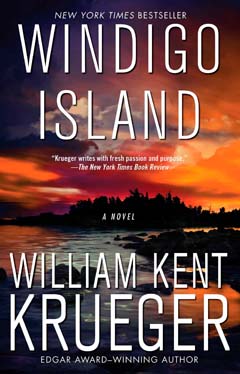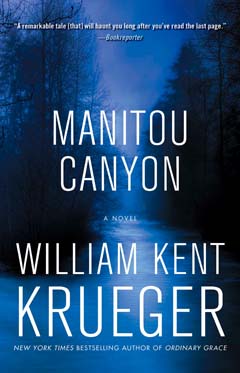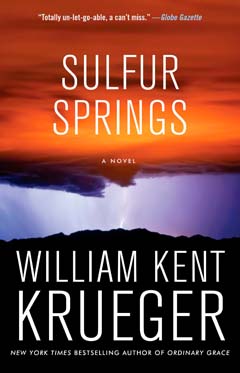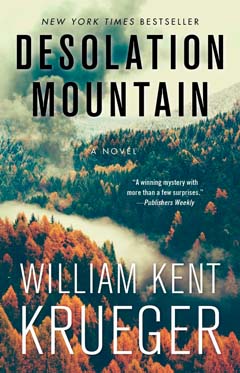A Cork O’Connor Mystery Novel – Book #7 | On Sale Now
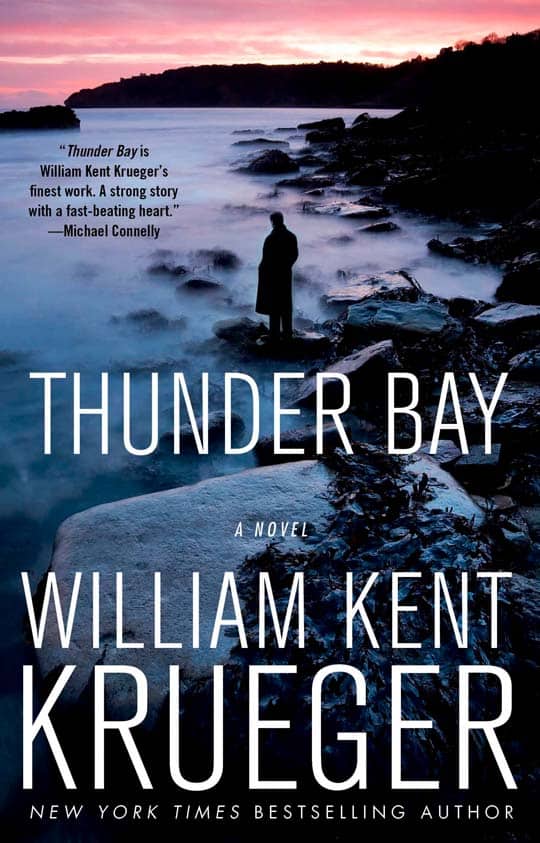
Order the Book
Atria Books Hardcover 2007, ISBN 0-7432-7841-0
Atria Books Trade Paperback 2009, ISBN 978-1439157824
DESCRIPTION
When detective Cork O’Connor agrees to unravel a mystery for his old friend Henry Meloux, he gets caught in a blistering crossfire of jealousy and revenge that dates back decades.
Happy and content in his hometown of Aurora, Minnesota, Cork O’Connor has left his badge behind and is ready for a life of relative peace, setting up shop as a private investigator. But his newfound state of calm is soon interrupted when Henry Meloux, an Ojibwe medicine man and Cork’s spiritual adviser, makes a request: Will Cork find the son that Henry fathered long ago?
With little to go on, Cork uses his investigative skills to locate Henry Wellington, a wealthy and reclusive industrialist living in Thunder Bay, Ontario. When a murder attempt is made on old Meloux’s life, all clues point north across the border. But why would Wellington want his father dead? This question takes Cork on a journey through time as he unravels the story of Meloux’s 1920s adventure in the ore-rich wilderness of Canada, where his love for a beautiful woman, far outside his culture, led him into a trap of treachery, greed, and murder.
The past and present collide along the rocky shores of Thunder Bay, where a father’s unconditional love is tested by a son’s deeply felt resentment, and where jealousy and revenge remain the code among men. As Cork hastens to uncover the truth and save his friend, he soon discovers that his own life is in danger and is reminded that the promises we keep—even for the best of friends—can sometimes place us in the hands of our worst enemies.
AWARDS
Winner, Minnesota Book Award for Genre Fiction (2008), Friends of the Saint Paul Library
Winner, Dilys Award (2008), Independent Mystery Booksellers Association
Winner, Northeastern Minnesota Book Award for Fiction, Poetry, Drama (2007), University of Minnesota
Winner, Lovey Award for Best PI / Police Procedural (2008), Love is Murder Conference
Winner (tie), Lovey Award for Best Series (2008), Love is Murder Conference
Nominee, Anthony Award for Best Novel (2008), Bouchercon World Mystery Convention
PRAISE
“William Kent Krueger is one of the best mystery writers out there, and Thunder Bay is his most powerful novel to date. Any reader who has yet to pick up one of his Cork O’Connor suspense novels is in for a rare treat.”
—Vince Flynn, bestselling author of the Mitch Rapp series
“Thunder Bay has everything that William Kent Krueger’s longtime fans have come to expect in this lovely series – and everything it needs to entice new readers into the fold. Steeped in place, sweetly melancholic in tone, it braids together multiple stories about love, loss, and family. The result is a wholly satisfying novel that is over almost too soon.”
—Laura Lippman, New York Times bestselling author of What the Dead Know
“William Kent Krueger has one of the most fresh and authentic voices in crime fiction. In Thunder Bay he uses it to tell a resonant, gripping story. Don’t miss this book.”
—S.J. Rozan, Edgar Award-winning author of In This Rain
“The deftly plotted seventh Cork O’Connor novel represents a return to top form… [T]he action builds to a violent and satisfying denouement.”
—Publishers Weekly (starred review)
“Krueger’s insightful portrayal of small-town life and his deepening exploration of Cork’s character…propel the story.”
—Booklist
“Crisp writing and original plots make this a series to watch.”
—Library Journal
“William Kent Krueger’s latest release, Thunder Bay, will not disappoint fans who love his adventures in Minnesota’s North Woods. New readers will see Krueger at his best.”
—Argus Leader (Sioux Falls, SD)
“Krueger writes about American Indians with the passion and grace that readers find in the novels of Tony Hillerman, Margaret Coel and James D. Doss. Thunder Bay is a splendid tale that readers will not soon forget.”
—The Capital Times (Madison, WI)
“Krueger weaves together multiple stories of love and loss, family and place in this strong and satisfying novel.”
—Journal and Courier (Lafayette, IN)
“Like sweet corn and the state fair, William Kent Krueger’s novels are an annual summer highlight…As O’Connor says, ‘Some days you eat the bear, some days the bear eats you.’”
—Minnesota Monthly
“Krueger’s clean writing and deeply felt sense of place make this novel a standout. Read it for the American Indian lore and a trip to the deep woods that requires no mosquito repellent.”
—Rocky Mountain News (Denver, CO)
“William Kent Krueger throws everything but the kitchen sink into Thunder Bay, the seventh story of his now ostensibly retired Minnesota private investigator Cork O’Connor, and it comes off as an ingenious base for a mystery that moves right along…The cast of characters is vivid, the plotting is strong and O’Connor’s retirement gets off to the kind of start that usually marks the launching of a career. It’s great fun.”
—The Washington Times
EXCERPT
Chapter 1
The promise, as I remember it, happened this way.
A warm August morning, early. Wally Schanno’s already waiting at the landing. His truck’s parked in the lot, his boat’s in the water. He’s drinking coffee from a red thermos big as a fireplug.
Iron Lake is glass. East, it mirrors the peach-colored dawn. West, it still reflects the hard bruise of night. Tall pines, dark in the early morning light, make a black ragged frame around the water.
The dock’s old, weathered, the wood gone fuzzy, flaking gray. The boards sag under my weight, groan a little.
“Coffee?” Schanno offers.
I shake my head, toss my gear into his boat. “Let’s fish.”
We’re far north of Aurora, Minnesota. Among the trees on the shoreline, an occasional light glimmers from one of the cabins hidden there. Schanno motors slowly toward a spot off a rocky point where the bottom falls away quickly. Cuts the engine. Sorts through his tackle box. Pulls out a pearl white minnow flash, a decent clear-water lure for walleye. Clips it on his line. Casts.
Me, I choose a smoky Twister Tail and add a little fish scent. Half a minute after Schanno’s, my lure hits the water.
August isn’t the best time to fish. For one thing, the bugs are awful. Also, the water near the surface is often too warm. The big fish—walleye and bass—dive deep seeking cooler currents. Unless you use sonar, they can be impossible to locate. There are shallows near a half-submerged log off to the north where something smaller—perch or crappies— might be feeding. But I’ve already guessed that fishing isn’t what’s on Schanno’s mind.
The afternoon before, he’d come to Sam’s Place, the burger joint I own on Iron Lake. He’d leaned in the window and asked for a chocolate shake. I couldn’t remember the last time Schanno had actually ordered something from me. He stood with the big Sweetheart cup in his hand, not sipping from the straw, not saying anything, but not leaving either. His wife, Arletta, had died a few months before. A victim of Alzheimer’s, she’d succumbed to a massive stroke. She’d been a fine woman, a teacher. Both my daughters, Jenny and Anne, had passed through her third-grade classroom years before. Loved her. Everybody did. Schanno’s children had moved far away, to Bethesda, Maryland, and Seattle, Washington. Arletta’s death left Wally alone in the house he’d shared with her for over forty years. He’d begun to hang around Johnny’s Pinewood Broiler for hours, drinking coffee, talking with the regulars, other men who’d lost wives, jobs, direction. He walked the streets of town and stood staring a long time at window displays. He was well into his sixties, a big man—shoes specially made from the Red Wing factory—with a strong build, hands like an orangutan. A couple of years earlier, because of Arletta’s illness, he’d retired as sheriff of Tamarack County, which was a job I’d held twice myself. Some men, idle time suits them. Others, it’s a death sentence. Wally Schanno looked like a man condemned.
When he suggested we go fishing in the morning, I’d said sure.
Now we’re alone on the lake—me, Schanno, and a couple of loons fifty yards to our right diving for breakfast. The sun creeps above the trees. Suddenly everything has color. We breathe in the scent of evergreen and clean water and the faint fish odor coming from the bottom of Schanno’s boat. Half an hour and we haven’t said a word. The only sounds are the sizzle of line as we cast, the plop of the lures hitting water, and the occasional cry of the loons.
I’m happy to be there on that August morning. Happy to be fishing, although I hold no hope of catching anything. Happy to be sharing the boat and the moment with a man like Schanno.
“Heard you got yourself a PI license,” Schanno says.
I wind my reel smoothly, jerking the rod back occasionally to make the lure dart in the water like a little fish. There aren’t any walleyes to fool, but it’s what you do when you’re fishing.
“Yep,” I reply.
“Gonna hang out a shingle or something?”
The line as I draw it in leaves the smallest of wakes on the glassy surface, dark wrinkles crawling across the reflected sky. “I haven’t decided.”
“Figure there’s enough business to support a PI here?”
He asks this without looking at me, pretending to watch his line.
“Guess I’ll find out,” I tell him.
“Not happy running Sam’s Place?”
“I like it fine. But I’m closed all winter. Need something to keep me occupied and out of mischief.”
“What’s Jo think?” Talking about my wife.
“So long as I don’t put on a badge again, she’s happy.”
Schanno says, “I feel like I’m dying, Cork.”
“Are you sick?”
“No, no.” He’s quick to wave off my concern. “I’m bored. Bored to death. I’m too old for law enforcement, too young for a rocking chair.”
“They’re always hiring security at the casino.”
Shakes his head. “Sit-on-your-ass kind of job. Not for me.”
“What exactly are you asking, Wally?”
“Just that if something, you know, comes your way that you need help with, something you can’t handle on your own, well, maybe you’ll think about giving me a call.”
“You don’t have a license.”
“I could get one. Or just make me a consultant. Hell, I’ll do it for free.”
The sun’s shooting fire at us across the water. Another boat has appeared half a mile south. The loons take off, flapping north.
“Tell you what, Wally. Anything comes my way I think you could help me with, I promise I’ll let you know.”
He looks satisfied. In fact, he looks damn happy.
We both change lures and make a dozen more casts without a bite. Another boat appears.
“The lake’s getting crowded,” I say. “How ’bout we call it and have some breakfast at the Broiler.”
“On me,” Schanno offers, beaming.
We reel in our lines. Head back toward the landing. Feeling pretty good.
Nights when I cannot sleep and the demons of my past come to torment me, the promise I made to Wally Schanno that fine August morning is always among them.
Discussion Guide
Thunder Bay
Introduction
In the seventh outing in this award-winning series, we find that Minnesota lawman Cork O’Connor has hung up his sheriff’s badge in order to set up shop as a private detective. When his beloved mentor Henry Meloux asks for his help in finding the son he never knew, Cork drops everything in order to help him. But when someone attempts to kill Henry, it becomes very apparent that perhaps his son doesn’t want to be found. Cork and Henry find themselves in the middle of a mystery that leads straight to a wealthy, eccentric businessman. The men travel to remote Thunder Bay, Ontario, in the hopes of figuring out the truth before anyone else gets hurt.
Questions and Topics for Discussion
1. Cork O’Conner has recently hung up his sheriff badge in favor of a small private investigation firm, and is faced with a case for his beloved mentor, Ojibwe healer Henry Meloux. Why do you think Cork owes such a debt to Henry? Cork can tell this particular case means a great deal to Henry: “Meloux had never seen his own son. Never carried him on his shoulders or held him when he cried. Never felt the small boy’s breath, warm and sweet smelling, break against his face. Never knew the pleasures of being for his son the slayer of monsters imagined in the night.” (p.18) Do you think Henry’s plight carries considerably more weight because of what Cork is dealing with in his own life, with his teenaged daughter, Jenny?
2. Maria deeply desires that she and Henry have a relationship like Maurice and Hummingbird’s. What obstacles keep them from being truly accepted as a couple? Why do you think Henry was so distrustful of the “white man?”
3. How are Maurice, the gentle mountain-man, and Henry similar? Despite his discovery of gold, Maurice cared little for it. What do you think was most important to him? He tells Henry about the “Path of Souls:” “Hummingbird told me about the Path of Souls. She told me she would be waiting for me at the end…I want to be on the Path of Souls. I want to be with Hummingbird.” (p.167) Henry is familiar with this Indian version of Heaven. What about it appeals to him?
4. What is the significance of the gold watch? Do you think Maria left it behind on purpose when Wellington forced her to leave the camp?
5. After Leonard Wellington abruptly leaves the camp, Henry has a powerful vision: “The silhouette that appeared was much larger than a man. It didn’t worry him. He stood to meet his enemy…He’d become a hairy beast, massive as a bear. He felt empty inside, except for an icy ball where his heart should have been. He was ravenous, hungrier than he ever remembered, and he could not wait to rip out Wellington’s heart and feast on it.” (p.174) What was your first impression after reading this passage? What role do visions play in the story?
6. In Chapter 45, Cork muses: “To be a son, to be a father, these things were more than just a blood tie. Maybe that’s what the hesitation was about. Did the relationship matter if, in the end, Wellington didn’t give a damn?” (p.251) Do you think Cork is implying that he’s worried about Meloux being disappointed? What really defines a father/son relationship? How does Cork’s own situation with his daughter, Jenny, relate to Henry’s, if at all?
7. Why do you think Meloux was relieved when he discovered that Leonard learned about Maurice and his gold from reading Maria’s journals?
8. Rupert confidently tells Cork, Henry and Wally Schanno that “a man’s reach should exceed his grasp; else what’s a heaven for?” (p.269) What do you think he means by this. Do you recognize this quote? (Hint: you can find out who said it onwww.brainyquote.com)
9. Have you read others in the Cork O’Connor series? After reading Thunder Bay,are you intrigued enough to read another one of Cork’s adventures? Which storyline did you prefer: the contemporary mystery or Henry’s story of how he met Maria Lima?
10. One of the most captivating elements in Kent Krueger’s novels is his depiction of strong, memorable characters. Who do you think is the most complex character in the novel, and why? What did you think of the subplot involving Cork’s daughter’s pregnancy? What did this bring to the novel?
11. Many Ojibwe words are scattered throughout the book. Did you feel like you learned something about Native American culture from this novel? If so, what did you learn? What about Henry’s role as a mide (or healer). How does this figure into the story? Is there something comparable in western culture?
Tips to Enhance Your Book Club:
1. Ojibwe words are scattered throughout Thunder Bay. You and your book club can learn more at this site: www.native-languages.org/ojibwe_words.htm
2. If your book club meets for dinner, why not try one of these Native American recipes, like Ojibwe spicy meat pies, to compliment your discussion? www.native-american-online.org/food.htm
3. You can learn more about scenic Thunder Bay, Ontario here: www.thunderbay.ca
4. Learn more about William Kent Krueger and his books at www.williamkentkrueger.com

